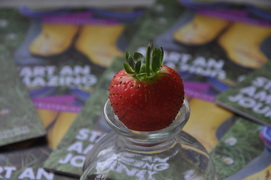
When my two children were very young - about 18 months and 3 years - they developed a new game. One of them would share out imaginary strawberries - 'One for me, one for you...'. Each imaginary strawberry received was eaten with imagined enjoyment. But eventually, one of the children would complain that the other had been given a larger imaginary strawberry than their own. An argument would ensue, becomingly increasingly heated and un-imaginary, and it would often end in tears which were all too real.
What we imagine affects us profoundly: our actions and reactions, our relationships, our ambitions, our priorities. It's no exaggeration to say that we live in a world shaped by imagination. Out of imagination arise vision, schemes, plans, strategies, which change the way things are for good or ill. Out of imagination emerge great works of poetry, literature, art, architecture, music. Far from being an escapist activity of children, it's fundamental to the working of human lives. 'Imagination is more important than knowledge', wrote Einstein. 'Everything you can imagine is real', said Picasso.
That's why Jesus called on his hearers to exercise their imagination. He spoke frequently of the (imaginary) Kingdom of God; a kingdom which was still to come into being, which as yet was largely in his imagination. He called others to share the vision and, most importantly, to make it real by living out what they could imagine. And he fed the imagination of others through the telling of stories, parables, often leaving them unexplained in order that his listeners would reflect imaginatively upon them and draw their own conclusions.
Christian faith is about imagining a better way of life - and then working to make it real. It's about imagining how we ourselves can become more Christ-like, and then working towards that aim (however inadequately most of us manage it). And in the case of parents and godparents, a Christening is about imagining for the child how they can be nurtured and nourished in the faith - and then, over the days and years which follow, turning that imagination into reality.
What we imagine affects us profoundly: our actions and reactions, our relationships, our ambitions, our priorities. It's no exaggeration to say that we live in a world shaped by imagination. Out of imagination arise vision, schemes, plans, strategies, which change the way things are for good or ill. Out of imagination emerge great works of poetry, literature, art, architecture, music. Far from being an escapist activity of children, it's fundamental to the working of human lives. 'Imagination is more important than knowledge', wrote Einstein. 'Everything you can imagine is real', said Picasso.
That's why Jesus called on his hearers to exercise their imagination. He spoke frequently of the (imaginary) Kingdom of God; a kingdom which was still to come into being, which as yet was largely in his imagination. He called others to share the vision and, most importantly, to make it real by living out what they could imagine. And he fed the imagination of others through the telling of stories, parables, often leaving them unexplained in order that his listeners would reflect imaginatively upon them and draw their own conclusions.
Christian faith is about imagining a better way of life - and then working to make it real. It's about imagining how we ourselves can become more Christ-like, and then working towards that aim (however inadequately most of us manage it). And in the case of parents and godparents, a Christening is about imagining for the child how they can be nurtured and nourished in the faith - and then, over the days and years which follow, turning that imagination into reality.
 RSS Feed
RSS Feed